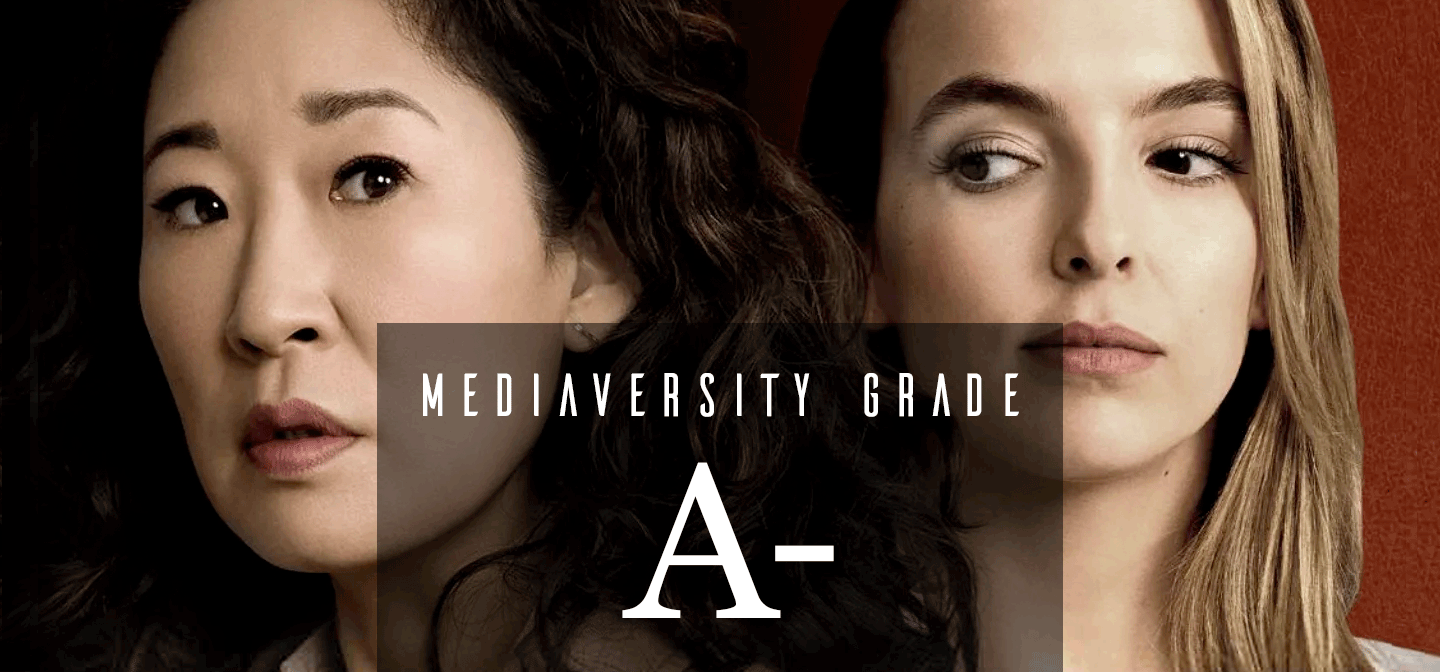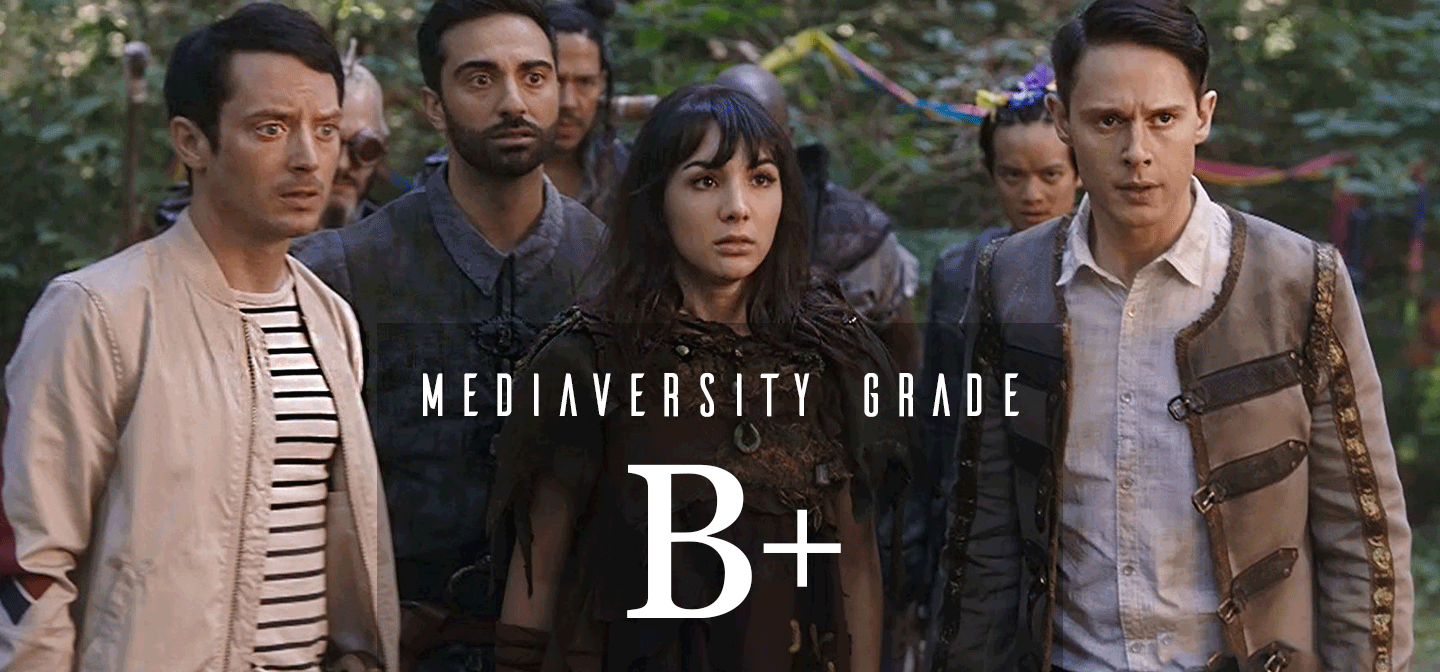Killing Eve - Season 1
“Sandra Oh finally has a role worthy of her acting chops in Killing Eve.”
Title: Killing Eve
Episodes Reviewed: Season 1
Creator: Phoebe Waller-Bridge 👩🏼🇬🇧 based on characters by Luke Jennings 👨🏼🇬🇧
Writers: Original book series by Luke Jennings 👨🏼🇬🇧, TV scripts by Phoebe Waller-Bridge 👩🏼🇬🇧 (4 eps), George Kay 👨🏼🇬🇧 (2 eps), Vicky Jones 👩🏼🇬🇧 (1 ep), and Rob Williams 👨🏼🇬🇧 (1 ep)
Reviewed by Mimi 👩🏻🇺🇸
—SPOILERS AHEAD—
Technical: 4.75/5
BBC America’s Killing Eve has become our latest obsession at Mediaversity. To start, the spy thriller features two capable and complicated women as main characters. And like the women at the center of the action, the frequent twists and turns of the plot rarely succumb to the predictable. Sandra Oh finally has a role worthy of her acting chops. The fashion, by costume designer Phoebe de Gaye, is delightful and meticulous. Even the soundtrack intends to bewitch us. All in all, the series delivers an unexpected kick in the pants to the often male-dominated genre.
Critical reception has been positive, despite occasionally jarring tonal shifts and inconsistent pacing. As one would expect from a show about a serial assassin, violence seems unavoidable. But there’s also catharsis and humor (albeit dark humor) thanks in large part to Jodie Comer’s charming portrayal of the plucky killer, Villanelle. Most importantly, the writing avoids the tired trope of using sexual assault against women to ignite or propel the story. For that reason alone, Killing Eve distinguishes itself from such “rape and revenge” works as the Kill Bill movies, or “sadistic torture porn” like Red Sparrow (2018).
Gender: 5/5
Does it pass the Bechdel Test? YES
The very first episode knowingly teases out the way in which women are overlooked and undermined professionally. Whip-smart British intelligence officer Eve Polastri (Oh) must deal with condescending superiors like Frank Haleston (Darren Boyd), who immediately shuts down her theory that the suspect they’re looking for in the homicide of a Russian politician is a woman. The parallel, though extreme, offers insight into why Eve becomes so fascinated with the idea of a female assassin whose very success lies in her ability to turn men’s sexism against them: Her targets fall victim precisely because they fail to regard her as a threat.
The relationship between Eve and Villanelle carries the show, while their relationships to men take a backseat. Eve’s dilemma stems from her desire to place her job first. When her husband objects out of concerns for her safety, Eve carries on, to the detriment of her marriage. Villanelle, too, chooses career over personal bonds. She follows orders to take out her handler and long-time mentor Konstantin (Kim Bodnia). Yet, in both instances, it’s never just about their careers. Eve ends up disobeying her boss Carolyn Martens (Fiona Shaw), and Villanelle cares very little about the shadowy organization known as The Twelve that pays her to do its bidding. They act in their own best interests, ultimately choosing themselves above all else. That’s also what makes their mutual admiration so exhilarating. Simply by being who they are, they have drawn each other in. The last scene of the season finale, “God, I’m Tired,” finds the two women lying in bed simply gazing at each other. The audience understands that they are the only ones who truly see one another.
Race: 4/5
Hats off to showrunner Phoebe Waller-Bridge for casting the Korean Canadian Oh. A line of dialogue about Eve’s backstory elegantly explains away her lack of a British accent, and thus allows Oh’s talent to shine through unimpeded in the role. Eve’s cultural identity becomes all the more crucial in “Don’t I Know You?” (Season 1, Episode 3), when she squares off against a slimy Chinese government official. His lack of morality and unwelcome sexual advances paint him as a modern-day, Yellow Peril caricature. Without Oh’s well-rounded character to balance out the racist stereotype, the episode could have easily fallen flat.
The series gestures to inclusive casting with Black British actress Kirby Howell-Baptiste playing Eve’s colleague Elena. Unfortunately, her character never fully develops. Once the narrative follows Villanelle to Russia in the latter half of the season, with Eve and Carolyn in hot pursuit, Elena becomes nearly invisible. Her screen time vanishes so much that by the season finale, she’s relegated to a faceless voice overheard on Eve’s phone. Given that Elena recedes into the background, Eve remains the lone person of color at the center of an otherwise very white story.
LGBTQ: 4/5
Villanelle’s bisexuality plays an integral part to her character. Towards the end of the season, we learn that her love for an older female teacher spurred her to perform her first act of killing (and male castration) on the woman’s husband. Villanelle also engages with both men and women as sexual partners throughout the series. But of course it’s her open desire for Eve that’s got us shipping the two. Although it remains unclear if the physical attraction is requited, the intensity of their intellectual and emotional connection cannot be denied. The danger lies in how Villanelle’s sociopathic nature feeds into the Depraved Bisexual stereotype that seemingly links her sexually adventurous attitude with a lack of morality.
We frequently witness yet another unfortunate cliché: dead gays and bisexuals. The body count includes Eve’s colleague Bill (David Haig), who tells her about his open marriage and past sexual encounters with men, shortly before he’s stabbed to death. Two of Villanelle’s female exes, including her former teacher as well as fellow assassin Nadia (Olivia Ross), also meet grisly endings.
Mediaversity Grade: A- 4.44/5
Killing Eve layers a romantically tinged will-they-won’t-they storyline with that of a cat-and-mouse game between a woman who represents lawfulness and another who embodies total chaos. It can’t be said enough how breathtaking it feels to watch two equally smart and tough-as-nails women compete with each other, week after week. And luckily for us, the chase appears to be continued.
The quickly-renewed show offers ample opportunity for more inclusive writing in its second season, particularly when it comes to representations of race and LGBTQ characters. The fact that the first season knocked it out of the park in terms of creating complex female characters indicates to me, at least, that the series wants to aim high. So let’s hold them to those expectations.




